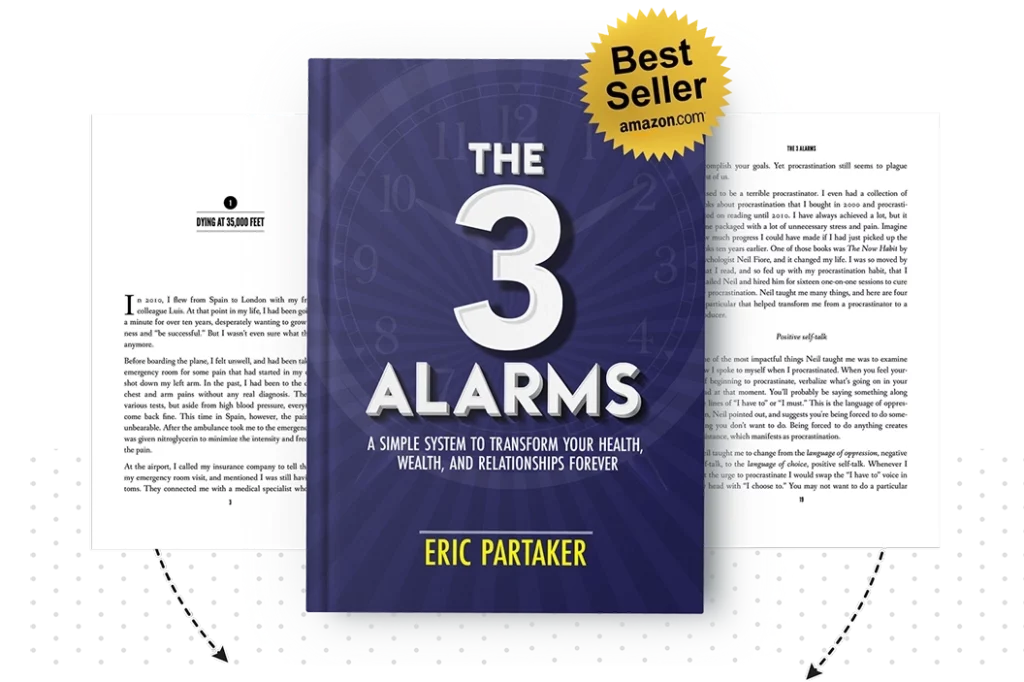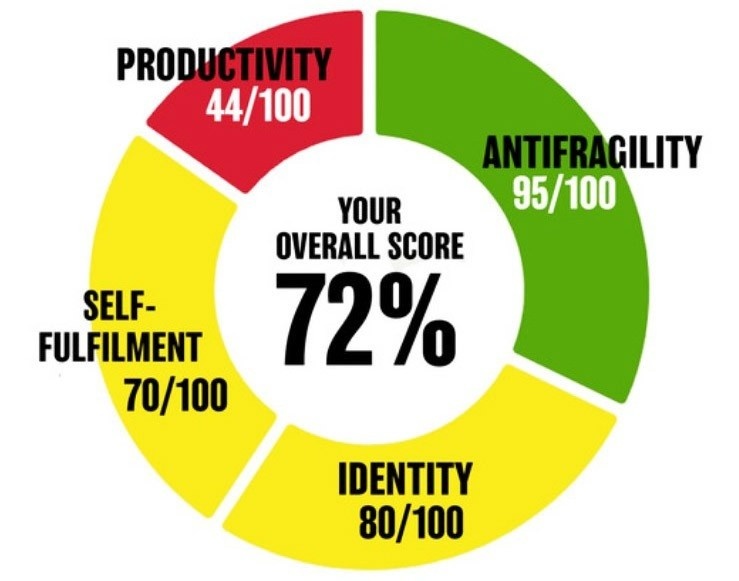SUMMARY
- About 10 years ago, I almost died while on a return flight to London from a near heart attack thirty-five thousand feet up in the air. At the time I was obsessed about “peak performance”, but I was approaching it in all the wrong ways, and my health paid for it. I knew then there had to be a way to perform at a super-high level and achieve my full potential, but without sacrificing my health and relationships. In this episode, I want to share some things that you can do to achieve peak performance without burning out.
- The number one thing I want to share is this equation for peak performance: stress plus recovery equals growth. Back then I was just focused on the stress piece and not the recovery piece. And so, I wasn’t getting true growth. We can’t just keep revving the engine at the highest level possible, or we’re going to blow a tire. The car is going to flip.
- The number two thing is, how do we train in that recovery? Because we’re very good at training the stress, but we don’t train our recovery with the same dedication or intent. But we can choose to do that. It really is just a choice, but we can also make it easy by thinking about the different ways in which we can recover.
- In addition, if we want to achieve peak performance without burning out, without sacrificing our health and relationships, then we need to think about pushing ourselves, but not too much. Steve Kotler, in his book, The Rise of Superman, he says that the magic number is 4%. We need to be constantly pushing ourselves 4% more, adding 4% to whatever the weight is that we’re lifting, running 4% longer, or trying to mentally strain ourselves 4% more.
- We also have to recognize the danger of smartphones. These are peak performance zappers. In a recent Journal of Social Psychology, they talk about just how damaging smartphones are, because smartphones put us in reactive mode. You pick up your phone and you see various notifications. You go into your social media, your email, and before you know it, you’ve just spent like an hour or more doing mindless things. The key thing is, out of sight, out of mind. Put the phone in a drawer or in another room when you work.
- And then lastly, to attain peak levels of performance without burning out, we need to know what is our North Star? What are we doing this for? What’s the value in it? Where is this all going?
TRANSCRIPT
About 10 years ago, I boarded a return flight to London, and shortly after the cabin doors closed and the plane began its ascent, I could send something was definitely not right. I had a lot of pressure. It started to build up in my chest. It went through my arm. It became quite painful. It felt as if somebody was sitting on my chest. My colleague sat next to me, realized something was definitely wrong, and he ran up to the stewardess. The stewardess frantically asked if there was a doctor on board. The doctor rushed over, took my vital signs, and I’ll never forget his words, “We need to land the plane immediately. I think he’s having a heart attack.”
If you think about hearing that 35,000 feet up in the air, you’re about as far away from help as you could possibly be, I guess it could have been in space, that would be even further away, but being 35,000 feet in the air, that’s pretty far already. I remember that plane descending, and it felt like an eternity. I was just terrified my heart would stop completely just before we reached safety. I kept thinking, “Please, fly faster, faster. Let’s just get there.”
Obviously, the plane touched the ground, and obviously, I was okay, or else this would be the most incredible trick ever, hearing from me right now. An emergency response team boarded the plane, and they took me into a waiting ambulance, administered nitrates, opened up the arteries, and I sped off to this local hospital.
I woke up the next day realizing that I couldn’t continue in this way. You see, I have been absolutely obsessed with peak performance, with achievement, but I was approaching it in all of the wrong ways. I mean, I did this through my career at McKinsey. I did this when helping build up Skype before we sold it to eBay. I did this in several of my own businesses. But that moment was pivotal for me. I’m very grateful for it because it started a whole search process. I knew that there had to be a way to perform at a super-high level, but without burning out. I knew there had to be a way to perform at a super-high level, achieve my dreams, achieve my full potential, but without sacrificing my health and relationships. I didn’t think about those two categories.
Going back to my story with being in that ambulance, for example, when that ambulance was speeding off to the local hospital, I looked up into the eyes of the paramedic looking down at me and I said, “Please, don’t let me die. I have a five-year-old son.” Because in a moment like that, when you think it’s lights out, game over, what truly matters, it comes out. Your soul speaks. I was speaking about relationships in that instance because that’s what truly mattered to me in that moment. I certainly wasn’t thinking, “Oh gosh. If I go, I’m not going to get around to my inbox,” or anything like that.
In today’s video, I wanted to share some things that you can do to achieve peak performance without burning out. My name is Eric Partaker, and I help entrepreneurs, leaders, CEOs, individuals achieve peak performance, but without sacrificing their health and relationships, drawing on my experiences and all the things that I’ve learned over the last 10 years.
Number one, the first thing that I learned when I really went deep on the field of peak performance … And I went very deep. I mean, I picked up a coaching certification from the High Performance Institute, read hundreds of books on the subject, really studied the science of habit formation with a coaching apprenticeship and certification with professor BJ Fogg. He runs Stanford University’s Behavior Design Lab.
In all of that work, one of the things that came out, the number one thing that I want to share with you is this equation for peak performance, that it’s stress plus recovery equals growth. We can’t just keep playing or revving the engine at the highest level possible, keep going around those corners as fast as we can. Eventually, if we do that, if we don’t let our foot off the brake at some point, we’re going to blow a tire. The car is going to flip. Something’s going to happen. But I was just focused on the stress piece and not the recovery piece. And so, I wasn’t getting true growth.
Think of it another way. If you’re in a gym, for example, and if all you’re going to do is try to lift the largest weight you’ve ever done in your life, and that’s your approach to growth, well, you’re probably going to hurt yourself. You might not even complete the repetition. But similarly as well, if your approach is to just pick up a one-pound or a one-kilo weight, and you’re just going to lift this many, many times with the hope of getting growth, well, you’re not going to get that as well because you don’t have enough stress in that instance. So, it’s the stress plus the recovery that equals growth.
One final example, in that gym setup, if you have no rest between your sets, you also will fail. So, we need that recovery. That’s the first thing that we need to do is just respect that equation, that it’s multiple things that need to come together, the stress and the recovery to create the growth that we want.
The number two thing is, well, how do we train in that recovery? Because we’re very good at training in the stress, let’s stress ourselves, let’s push ourselves harder, let’s hit that next level. But we don’t train or kind of practice our recovery with as much dedication or intent as we do trying to stress ourselves and push ourselves. But we can. We can choose to do that. It really just is a choice, but we can also make it easy by thinking about the different ways in which we can recover. I’ll share some quick ones with you right now.
One of the first things that I like to do to start every single day is just a few minutes of meditation. You don’t need to go to a Buddhist monastery or something or become a monk to learn how to meditate. You don’t even need an app or all these fancy tools. One of the simplest things that you can do to meditate and to practice your recovery, just for a few minutes at the start of each day, is simply count your breaths. So, close your eyes, settle in a chair, and count to 10, one, two, up to 10. With each breath, picture yourself relaxing, and just keep that count. When you get to 10, start at one again. Do that for five, 10 minutes.
The other thing that I like to do is build in breaks throughout my day, so micro-breaks every 15 minutes or so. I like to stand up. I just use a simple timer. And then every hour, I like to take a break as well, get up, walk around, have a glass of water, move a little bit. Don’t sit for the whole day. That’s keeping yourself in stress mode. Not enough recovery, you won’t get the growth that you’re looking for.
Also, getaways. We tend to think about just the holidays, but what about the getaways? Once a month, could you be going away for a weekend, or at least once a quarter? But then, of course, your holidays as well, can you be planning those in, so you get full, complete recovery? Those are some quick examples of how you can be training in your recovery as much as you kind of train pushing yourself or train the stressing of yourself, if you will.
Number four, if we want to achieve peak performance without burning out, without sacrificing our health and relationships, then we need to think about pushing ourselves, but not too much. Steve Kotler, in his book, The Rise of Superman, he says that the magic number is 4%. We need to be constantly pushing ourselves 4% more, adding 4% to whatever the weight is that we’re lifting, running 4% longer, or trying to mentally strain ourselves, if you will, 4% more. But it’s just a tiny bit more because if we do more than that, then we run the risk of burning out, or breaking down, or just giving up.
Another way to think about this is challenges that are just about manageable, we can just about do this, but still pushing us. When we sense that discomfort, when we sense that little bit of dread or, oh, this is going to be difficult, that’s a great signal for peak performance. If it feels completely overwhelming, like I’m not going to be able to do it, that might be a signal that you’re going too hard, you’re going beyond that 4%. We want that challenge to just about be manageable but still be pushing us a little bit more, out of our comfort zone for sure, but not too far out that we feel overwhelmed, or we’re going to fail completely.
Number five, we have to recognize how dangerous our smartphones are. I mean, these are peak performance zappers. In a recent Journal of Social Psychology, they talk about just how damaging smartphones are because smartphones put us in reactive mode. I mean, think about it. You pick up your phone and you see various notifications, you go into your social media, you go into your email, you start browsing the news, and it just puts you in this reactive mindset. And before you know it, it’s like, poof, you’ve just spent like an hour or more throughout the course of the day doing quite mindless things.
And even if we see, in this Journal of Social Psychology, in the study that they did, if the participants’ smartphones were visible, they could see their smartphone, their ability to remain focused and concentrate was significantly inhibited. When they took their smartphones away and then they just left somebody else’s smartphone there on the desk, the same thing happened. When they saw even someone else’s phone, they still were working in a distracted state. They weren’t achieving as high output as they could.
The key thing is, out of sight, out of mind. Don’t put your phone on airplane mode in the corner of your desk, where you can still see it. That’s not good enough. Research proves that you will still have this distraction residue going on in your mind that will prevent you from properly and fully engaging in whatever it is. And if you can’t fully engage, if you can’t push yourself that 4% more, you won’t be getting into that peak performance territory.
So, what I highly recommend is that when you’re working on something that’s super important to you, where you really want to push yourself and start performing at that higher level, out of sight, out of mind. Put the phone in a drawer, in another room, nowhere near you, and definitely have the ringer off, have the notifications off. You don’t even want to be hearing those from a distance.
Number six, we need to view stress positively. Stress is good. Again, once again, we stress a muscle, and it causes it to grow, provided we have the recovery. A lot of people, they try to avoid stress. They stress themselves out trying to live this stress-free life, when … In another study, for example, if you have three groups of people, one that lived fairly stress-free, another that had stress but viewed it positively, and a third that had stress but viewed it negatively, it’s the second group, the group that had stress but viewed it positively that even outlives the first group with virtually no stress at all.
So, our view of stress, which we will experience 100% … Because if you’re going for peak performance, and if you’re constantly pushing yourself just outside your comfort zone, and if that’s a way of life for you, which I hope it is so that you can reach your full potential, if you’re doing that, then you will experience stress. You will feel like, “Oh, man, I don’t feel like doing this right now,” or, “I don’t have what it takes.” You’re going to have doubts. Your mindset’s going to go down.
But if you view that stress, if you reframe it as repetitions to complete in the gym of life, almost like a physical exercise but it’s a mental one, if you view it positively, if you turn life into your peak performance training camp, then you can view these things in a different way to your benefit, and they can help you remain … sorry, keep that positive outlook that you have on whatever it is that you’re doing. So, stress is a good thing, provided we view it in the right way.
And then number seven, to attain peak levels of performance without burning out, we need to know what is our North Star? What are we doing this for? Why? What’s the value in it? Where is this going? One of the things that I reflect on often with what my work within the field of peak performance is that I realize that I’m helping people close that gap between who they are, who they’re capable of being. I’m helping people become all that they can be. I’m helping people realize their full potential.
Abraham Maslow, in his hierarchy of needs, he estimated that, at the top, there is self-actualization, when someone realizes their full potential, that only one or 2% of people in the world ever experience that. I tap back into that because I think, “Well, if I can grow that percentage, if that one to 2% can become 5% or 10% through my message, through my work, that inspires me to keep going. That inspires me to keep going at a peak performance level.” So, really tap into your why, understand your purpose, and have that be the fuel for your fire.




